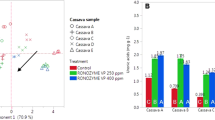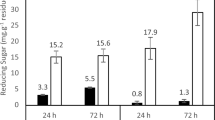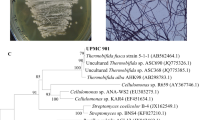Abstract
CULTURE fluids of the soft-rotting bacterium Erwinia aroideae contain polygalacturonase activity and cause maceration of parenchymatous tissue. Much indirect evidence has indicated that polygalacturonase causes maceration; for example, both activities respond in the same way to pH, precipitation by organic solvents, and dialysis1. It has been demonstrated2 that culture fluids of the closely related E. carotovora degrade pectate by transelimination rather than by hydrolysis. Methods for measuring polygalacturonase activity do not distinguish generally between hydrolysis caused by polygalacturonase and transelimination caused by pectate transeliminase, and it is probable that in many cases reactions ascribed to the first are caused by the second.
This is a preview of subscription content, access via your institution
Access options
Subscribe to this journal
Receive 51 print issues and online access
$199.00 per year
only $3.90 per issue
Buy this article
- Purchase on Springer Link
- Instant access to full article PDF
Prices may be subject to local taxes which are calculated during checkout
Similar content being viewed by others

References
Wood, R. K. S., Ann. Bot., N. S., 19, 1 (1955).
Starr, M. P., and Moran, F., Science, 135, 920 (1962).
Byrde, R. J. W., and Fielding, A. H., Nature, 196, 1227 (1962).
Byrde, R. J. W., and Fielding, A. H., Nature, 205, 390 (1965).
Author information
Authors and Affiliations
Rights and permissions
About this article
Cite this article
DEAN, M., WOOD, R. Cell Wall Degradation by a Pectate Transeliminase. Nature 214, 408–410 (1967). https://doi.org/10.1038/214408a0
Issue Date:
DOI: https://doi.org/10.1038/214408a0
This article is cited by
-
Anwendung der analytischen Gr��enausschlu�-Chromatographie zur Untersuchung des Substratahbaus einer kommerziellen Pektatlyase ausErwinia carotovora
Zeitschrift f�r Lebensmittel-Untersuchung und -Forschung (1994)
-
Pectin transeliminase complex fromAspergillus flavus
Folia Microbiologica (1993)
-
Pectolytic enzymes produced byRhizoctonia bataticola in culture andRhizoctonia-infected tissues of potato tubers (Solanum tuberosum L.)
Mycopathologia (1993)
-
Pectinolytic enzymes associated with the soft rots ofCitrus sinensis caused byAspergillus aculeatus andBotryodiplodia theobromae
Mycopathologia (1982)
-
Inducer of pectic acid lyase in Erwinia carotovora
Nature (1977)
Comments
By submitting a comment you agree to abide by our Terms and Community Guidelines. If you find something abusive or that does not comply with our terms or guidelines please flag it as inappropriate.


